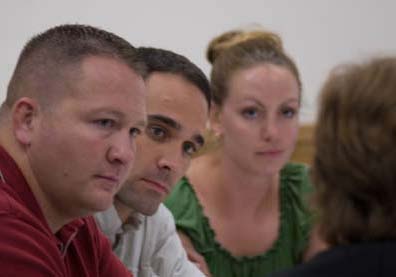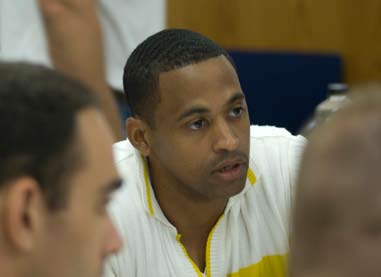The College's master's program for West Point is making its mark on military training
As situations around the world nowadays make abundantly clear, military engagement in the 21st century is as much about breeching cultural divides and building trust as it is about combat.
So when Lt. Col. Todd Henshaw at West Point was looking for a new leadership training program for young Army officers, he didn’t ask the Pentagon or turn to a business school or a commercial program like Six Sigma or Franklin Covey’s “The Seven Habits of Highly Successful People.” Instead, Henshaw chose an unlikely source of military-style style instruction or business management: TC.
Henshaw had some explaining to do to West Point alumni, staff and curious onlookers. “I got a lot of e-mails saying, ‘What are we doing messing around with all those liberals down in New York?’ he recalls, laughing. “Columbia doesn’t let ROTC recruiters on campus. It was almost like we brought somebody home from the wrong side of the tracks.”
But, working with Col. Thomas Kolditz, Chair of the Department of Behavioral Science and Leadership at West Point, he approached Warner Burke, coordinator of graduate programs in social-organizational psychology and Chair of TC’s Department of Organization & Leadership (and a former Army field artillery lieutenant) for help in designing and teaching a master’s program for mid-career Army officers, many fresh from tours of duty in Afghanistan or Iraq.
The program took its first cohort of officers in 2005 and begins its fourth year this fall. After 12 months of full-time study including weekly visits to the TC campus and a six-month internship, participants earn a master’s degree in organizational psychology. Most stay at West Point for another two years to train Army cadets, who, in turn, learn to incorporate these concepts into their work with young soldiers on the battlefront. Each of them becomes a new type of leader who is as focused on the psychological and cultural growth of soldiers as on fighting prowess.
On Wednesdays, Burke and his colleagues travel to West Point to teach. On another day (this year it’s Mondays), the West Point students come to TC, split up, and take a Group Dynamics course alongside other TC students. This system has brought mutual benefits for both cohorts of students, Burke says. “Our students now really welcome them, and why? It’s because the West Point students are mature and experienced. You know exactly who they are when they are walking down the hall. It’s been good for both sides. And the military students love coming to the City. That’s no small benefit.”
The program Burke and his colleagues designed, and now teach, is very different from most traditional military training programs, which tend to emphasize physical as much as intellectual development. Without sacrificing physical training, the officers in this program also learn about psychology, counseling and coaching, adult development, organization development and leadership strategic planning—areas of study that enhance their ability not only to be strong personal role models for those under their command, but to lead large organizations and look more broadly at cultural and political differences, wherever they are serving.
West Point and TC just renewed their contract to collaborate for five more years on the program, which has graduated 20 to 25 officers per year since 2006 and is starting to get attention from other branches of the military. According to Henshaw, after looking carefully at the West Point program, the Navy designed something similar. And one of Henshaw’s proudest moments came when two retired, four-star generals, each now working as business consultants, called him for advice. The New York City Department of Education sent a delegation to West Point, led personally by Chancellor Joel Klein, and Henshaw has begun to get calls from businesses that want to adopt the program.
Henshaw believes the program could radically change the military. “I am such a huge fan. If you think about the types of situations that the Army is going to be involved in over the next 20 to 30 years, they’re going to be cross-cultural. We’re going to need to understand people, understand organizations and institutions, understand markets, change populations, set up micro-societies. The more sophisticated those challenges, the more we will need programs like this. I wish somebody would say, ‘Henshaw, just crank it up to 100 [students per year]. Bring in the Air Force, the Navy—bring them all in.’
Published Thursday, Oct. 16, 2008

